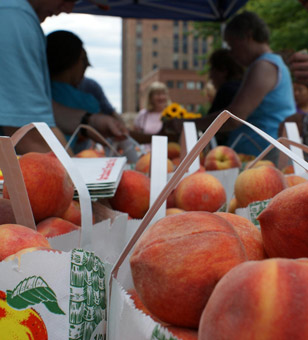Did you know that Truthout is a nonprofit and independently funded by readers like you? If you value what we do, please support our work with a donation.
Washington – Farmers markets are a popular source of reasonably priced fresh produce, but across the country many accept only cash or checks – a big problem for low-income shoppers using food stamps. The U.S. Department of Agriculture is trying to change that.
Agriculture Deputy Secretary Kathleen Merrigan this week announced a $4 million grant for states to help implement wireless technology that will allow more farmers markets to accept Supplemental Nutrition Assistance Program benefits, or food stamps.
Markets need wireless Internet or land-line connections in order to accept payments from customers using government benefits, a system known as Electronic Benefits Transfer. The system isn’t always available for outdoor markets in parks or parking lots, and small markets often can’t afford to set up the technology.
Two years ago, Jeff Dabbelt of Lexington Farmers Market in Lexington, Ky., set up a machine on his own to accept EBT payments. “I had to convince my directors that it was going to be worth the additional cost,” he said.
Last year, the market brought in $14,000 from EBT cards, Dabbelt said.
“There can be some inherent business that comes to your table just by the machine being there,” he said.
Although he had to go through bureaucratic channels to set up the machine, he was happy to learn that the federal government will offer some assistance to smaller markets. Currently, of 7,100 USDA-registered farmers markets nationwide, 1,500 accept EBT cards, according to government figures. The use of the cards at farmers markets has quadrupled since 2008.
“I’m all about it,” Dabbelt said. “It’s almost a necessity, if not outright 100 percent necessary.”
“That assistance would be invaluable all across the country,” he said.
Health experts say a lack of affordable healthy food in low-income communities is directly related to high levels of obesity.
“The retail food environment is not the same in every neighborhood,” Brian Smedley of the Health Policy Institute at the Joint Center for Political and Economic Studies said this week at a Centers for Disease Control and Prevention obesity summit.
While recent studies have found that poor urban neighborhoods don’t lack grocery stores and supermarkets, some experts say that finding fresh, affordable produce remains a challenge in these areas. According to a federal study released during the CDC’s “Weight of the Nation” summit, the lack of access to healthy foods directly contributes to high U.S. obesity rates.
“As the trends show, people have a very tough time achieving healthy weights when inactive lifestyles are the norm and inexpensive, high-calorie foods and drinks are readily available 24 hours a day,” said former Agriculture Secretary Dan Glickman, the chair of the committee that produced the report.
Some cities have taken the matter of improving food environments for low-income residents into their own hands. In 2006, Cleveland city council member Joe Cimperman discovered that only half of his city’s farmers markets accepted food stamps, a practice that he described as “very sinful.”
He and his colleagues passed legislation mandating that any markets that use public land, including sidewalks and streets, accept EBT payments.
“Today, every single farmers market in the city of Cleveland does,” Cimperman said.
Erin Gillespie, a representative for Florida’s Department of Children and Families, which administers the state’s food stamps program, pointed out an additional benefit of federal funding for farmers markets.
“Obviously, some of these farmers markets are small and probably don’t have a lot of income to spend on technology to accept EBT cards,” Gillespie said. “It will help them stay in business, and for people who need the assistance, it would give them access to healthy food that they may not have access to.”
© 2012 McClatchy-Tribune Information Services
Truthout has licensed this content. It may not be reproduced by any other source and is not covered by our Creative Commons license.
A terrifying moment. We appeal for your support.
In the last weeks, we have witnessed an authoritarian assault on communities in Minnesota and across the nation.
The need for truthful, grassroots reporting is urgent at this cataclysmic historical moment. Yet, Trump-aligned billionaires and other allies have taken over many legacy media outlets — the culmination of a decades-long campaign to place control of the narrative into the hands of the political right.
We refuse to let Trump’s blatant propaganda machine go unchecked. Untethered to corporate ownership or advertisers, Truthout remains fearless in our reporting and our determination to use journalism as a tool for justice.
But we need your help just to fund our basic expenses. Over 80 percent of Truthout’s funding comes from small individual donations from our community of readers, and over a third of our total budget is supported by recurring monthly donors.
Truthout has launched a fundraiser to add 460 new monthly donors in the next 8 days. Whether you can make a small monthly donation or a larger one-time gift, Truthout only works with your support.
